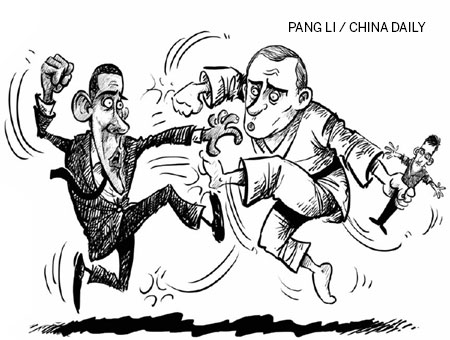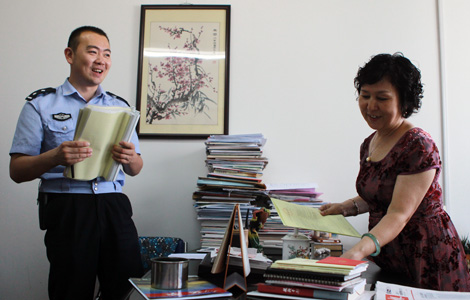US, Russia may control rift
Updated: 2013-08-14 07:55
By Chen Xiangyang (China Daily)
|
||||||||

US-Russia relations have reached a new low with US President Barack Obama canceling his meeting with his Russian counterpart Vladimir Putin. US-Russia ties were floundering even before former National Security Agency operative Edward Snowden sought asylum in Russia. Moscow's decision on Aug 1 to grant asylum to Snowden for one year worsened an already imperfect relationship, with Obama saying he was "disappointed" by Moscow's "Cold War" mentality at times.
Obama decided to cancel the presidential meeting scheduled for September in St Petersburg, where the two leaders will attend the G20 summit. And with no solution to the differences between the US and Russia in sight, Moscow is likely to remain locked in an all-round competition with Washington.
In military security, Russia believes in a nuclear equilibrium and strategic balance with the US, while the US has been trying to prove its superiority over Russia. Politically, the US seems keen to interfere in Russia's internal affairs, which Russia is resolutely opposed to. The two sides disagree on a range of issues like the Syrian crisis, human rights, arms control and cybersecurity. In the fields of finance, trade and energy, Russia does not want the hegemony of the dollar to continue, and advocates reform of the international monetary system and safeguards for its energy interests.
The US-Russia conflict has intensified because the "structural contradictions" between them are deep-rooted and complex. The US is bent on establishing a unipolar world, while Russia is committed to helping build a multipolar international order. Moreover, Washington sees itself as the victor and Russia as the vanquished of the Cold War. Such an attitude toward and disregard for Russia are too much for the Russian leadership to digest.
The US regards the Russian leadership as "authoritarian" and is loath to see Putin back as president. And true to its history of interfering in other countries' affairs, the US continues to back the Russian "opposition" in the hope of instigating a "color revolution" in the country.
The two countries don't see eye-to-eye on geostrategic issues either. The US has been squeezing Russia's geopolitical space since the end of the Cold War and continues to promote NATO's eastward expansion. The US backed Georgia when it engaged in a military conflict with Russia, adopted a hostile attitude toward the Syrian and Iranian authorities over the Syrian crisis and the Iranian nuclear issue. In contrast, Russia supports the Syrian government's efforts to fight terrorists and quell insurgency, and advocates a political solution to the Iranian nuclear issue.
With regard to strategic security, the US continues to expand the deployment of its missile defense systems to consolidate its hold over the world, something that Russia is vehemently opposed to. Russia, on its part, is determined to maintain a strategic balance.
The Prism and other US surveillance programs exposed by Snowden show that Washington has violated other countries' sovereignty and reflect its hegemonic ambitions in cyberspace. Not surprisingly, Russia is one of the major countries the US has been spying on.
Besides, the discovery and large-scale exploitation of shale gas is changing the pattern of global energy supply, and Russia, as a major oil and gas supplying country, feels the challenge that the new development poses to its economy.
Putin is a seasoned campaigner and resourceful leader, and one of a few genuine strategists in the world. He has made the revival of the Russian nation his goal in life, for which he has adopted some foreign policies. This has brought him into confrontation with the US' hegemonism and power politics.
The differences between the US and Russia are, to some extent, difficult to be resolved because Washington seeks hegemony by expanding and consolidating its influence, while Moscow is opposed to hegemony and believes in a multipolar world, and is committed to safeguarding its sovereignty, security and geopolitical interests.
But despite the contradictions between the US and Russia being profound and complex, theirs is not a zero-sum relationship. At the mercy of a number of objective and subjective factors, the two countries will continue to interact in a pragmatic way and avoid creating a Cold War-like scenario. Instead of moving toward an all-out confrontation, Russia and the US are likely to keep their relations within a controllable range of competition and cooperation.
Globalization has made countries interdependent, but it has also brought about many international challenges. Russia and the US share a lot of common interests and stand to gain by continuing to cooperate on some core issues, including the anti-terrorism campaign and arms control. Considering the wide strategic differences between the two powers, Russia will have to act according to its capability and the US has to refrain from stepping on Russia's foot.
It appears the US-Russian relationship will continue to evolve in a complicated manner, which will have an impact on the international strategic situation, especially on the "collective game" between emerging countries and Western powers. Also, the complicated US-Russia ties will widen the scope of China's "strategic opportunities", because Washington's moves, especially its "pivot to Asia" policy (aimed at containing China), have prompted Beijing and Moscow to strengthen their strategic collaboration.
The author is deputy director of the World Politics Research Institute, affiliated to the China Institutes of Contemporary International Relations.
(China Daily USA 08/14/2013 page12)

 Huawei unveil Ascend P6 smartphone in Vienna
Huawei unveil Ascend P6 smartphone in Vienna
 That's one cool game of mahjong
That's one cool game of mahjong
 Isinbaeva leads harvest day for host Russia
Isinbaeva leads harvest day for host Russia
 Perseid meteor shower puts on show in night sky
Perseid meteor shower puts on show in night sky
 Bird flu, slowdown hit sales at fast-food chains
Bird flu, slowdown hit sales at fast-food chains
 PetroChina poised to dominate Iraqi oil
PetroChina poised to dominate Iraqi oil
 Marriage attitudes slowly change
Marriage attitudes slowly change
 On frontline of fight against crime
On frontline of fight against crime
Most Viewed
Editor's Picks

|

|

|

|

|

|
Today's Top News
Brazil demands clarifications on NSA surveillance
2nd-generation ID cards to include fingerprints
Chinese students boost boarding business in US
TCM chain probed after illegal house exposed
Friends of accused Boston bomber due in court
Economic hub on Bohai Bay
PM to visit China for milk scare
Donors of organs easing transplant shortages
US Weekly

|

|




